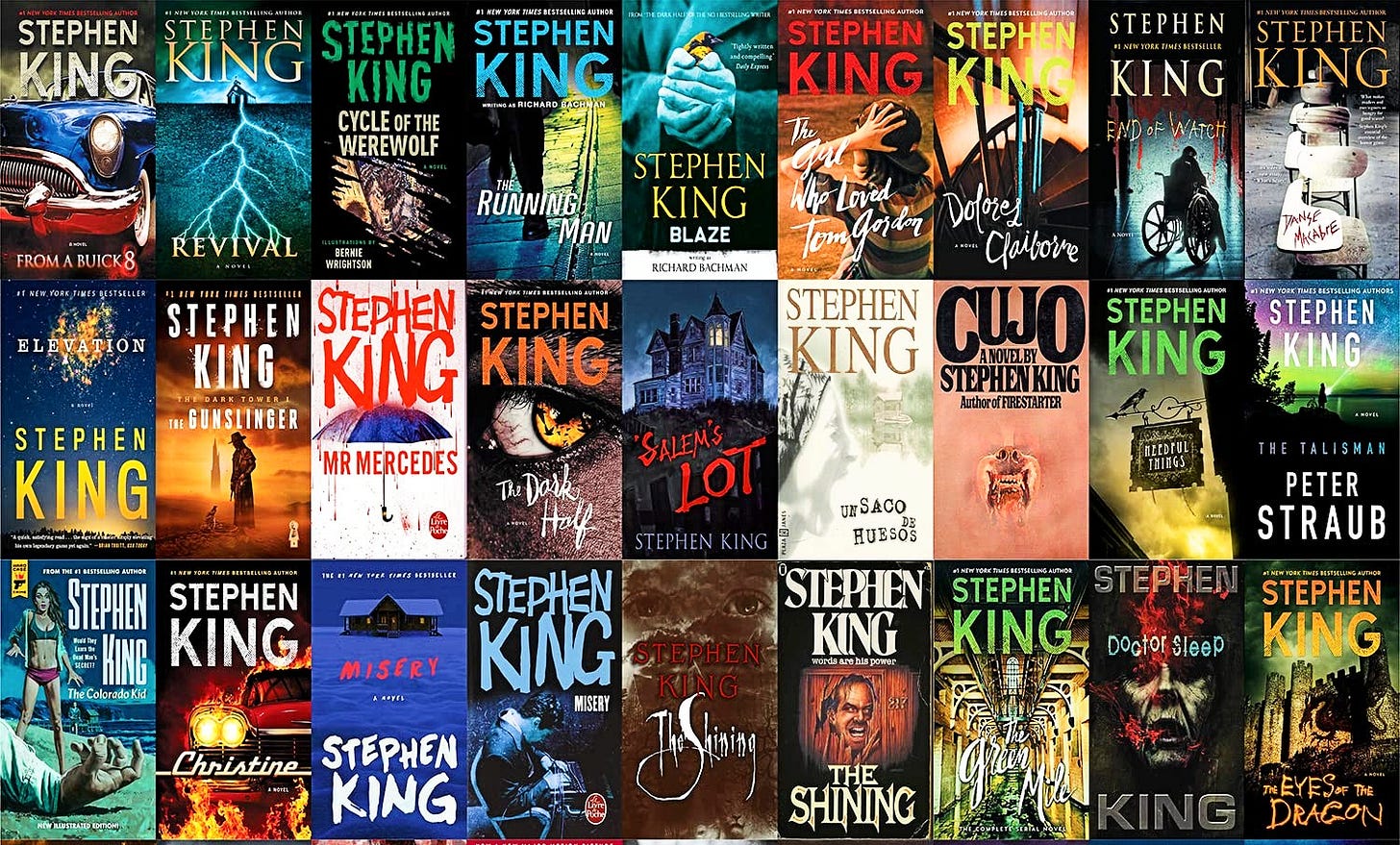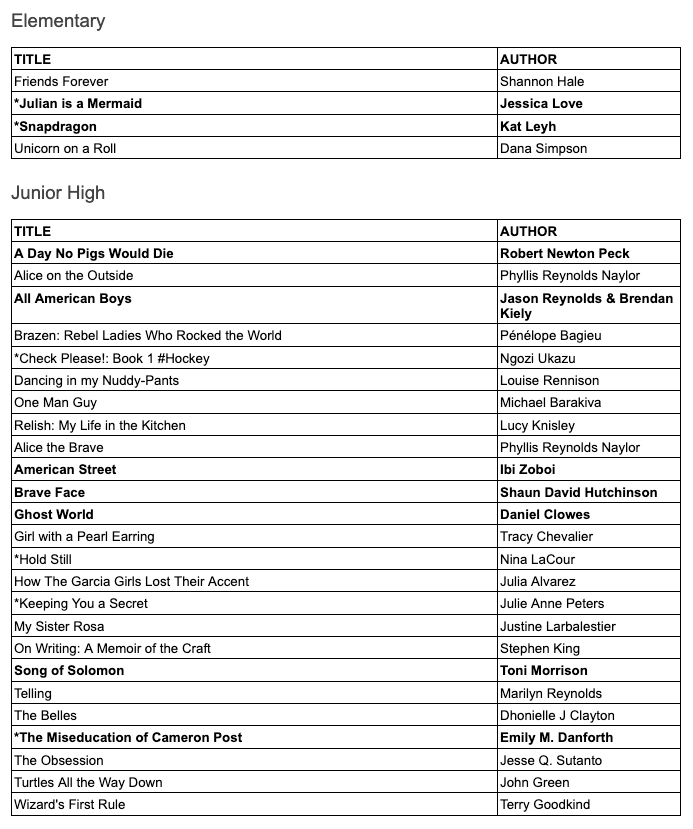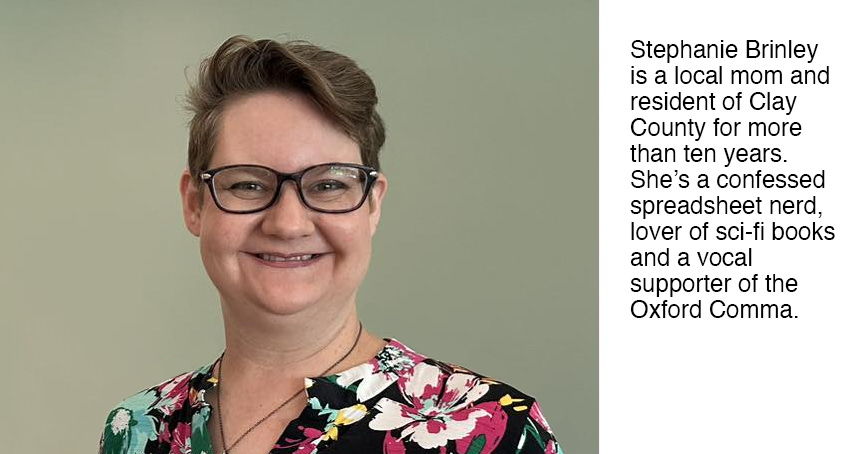Using AI To Rationally Assess Clay Schools Book Controversy
Fun Fact: Not a Single Steven King Novel Remains

The author, a self-described spreadsheet nerd, says she has checked and double checked the numbers below. We promise that if anyone discovers a mistake, we will be happy to correct it. That’s the beauty of an online publication.
By STEPHANIE BRINLEY
Let's start by clearing things up. I do not think Clay County District Schools has banned any books. They have removed some books from the library collection at the request of individual taxpayers. Children and teens still have access to these books through other channels, such as Clay County Libraries and bookstores, the schools have just made it harder for them to access.
The number keeps going around that over 400 books were removed in the 2022-2023 and 2023-2024 school years for pornographic content. I wanted to gain more insight into what was actually being removed from our school libraries, so I started digging. It seemed only right to share what I've learned.
Taxpayers and parents will draw a variety of conclusions for this data and continue to disagree on the best solution. This article is not to convince you of the best approach, it's to help everyone approach the topic from a place of knowledge instead of emotions.
Challenged Books Are .6 Percent of Clay Schools Collection
According to Dr. Cynthia Johnson, aupervisor of Instructional Resources for Clay Schools, the library collection currently contains approximately 162,000 books. Based on the District Reconsideration List, published by Clay Schools, there were 952 books up for reconsideration for the 2022-2023 and 2023-2024 school year.
Some of these books were challenged by taxpayers, and others were added internally. The list does not tell us how the books arrived on the list, but we know school librarians "weeded" a total of 56 of the books, leaving 896 books that were potentially challenged by taxpayers. That is 0.6 percent of all books in the collection.
Last August, Clay Today wrote about the school district using state law to evaluate books when explaining why some titles were removed while others were not. "Up until the time of the new community standards rubric being implemented, every book removed was due to an 847-obscenity violation," School Board Member Michele Hanson of District 4 said.
Chapter 847 Section 001 of the Florida Statutes has a definition list of what constitutes obscenity. Unfortunately, it's not always easy for people to agree about what is "without serious literary, artistic, political, or scientific value for minors."
Peter Swanson, writing for Clay News & Views, said, "The late Supreme Court Justice Potter Stewart once declined to define pornography to the court, but famously added, But I know it when I see it. I thought I did, too, but after seeing some of the books in Clay schools that activist-parent Bruce Friedman has challenged, I’m confused."
Removed Books, By the Numbers
All challenged titles removed during the 2022-2023 and 2023-2024 school years were because the Clay County District Schools’ Oversight Committee determined they violated Chapter 847. Let's look at the books that were removed after being challenged.
Again, the Oversight Committee used Chapter 847. Section 001 (12) defines obscenities in the following way:
(a) The average person, applying contemporary community standards, would find, taken as a whole, appeals to the prurient interest;
(b) Depicts or describes, in a patently offensive way, sexual conduct as specifically defined herein; and
(c) Taken as a whole, lacks serious literary, artistic, political, or scientific value.
The District Reconsideration List does not identify grade levels for books from 2022-2023. ChatGPT was used to determine the age level recommended for each book. When asked where the information came from, the AI answered:
I used a combination of common guidelines and typical age appropriateness for young adult and children's literature to determine the recommended grade levels. Many of the books listed are well-known in educational and literary communities, and their recommended reading levels are based on factors such as content maturity, themes, and complexity.
Because it is a matter of debate, ChatGPT was also asked which titles were considered "LGBTQ+ friendly." When asked how the term was defined, ChatGPT offered the following:
An LGBTQ+ friendly book features positive representation of LGBTQ+ characters and themes, uses inclusive language, and accurately reflects LGBTQ+ experiences. It portrays supportive environments and relationships, educates readers on LGBTQ+ issues, and includes diverse perspectives, ensuring respectful and affirming depictions of the LGBTQ+ community.
Additionally, ChatGPT was asked to list books that are known to have been frequently challenged or removed.
All statistics shared below are based on the following numbers:
162,000 books in Clay Schools libraries collection
896 books challenged (435 from 22-23, 461 from 23-24)
56 books weeded
404 books removed (179 from 22-23, 255 from 23-24)
Looking at both years, .6 percent of books in the collection were challenged and .28 percent of the total collection was weeded or removed.
Some other interesting facts to take away from the list:
67 books identified as "LGBTQ+ Friendly" weeded or removed
68 books by Stephen King (his entire bibliography) removed
16 books by Ellen Hopkins weeded or removed
8 books by David Levithan weeded removed
8 books by Sarah Mass removed
Breakdown of the 460 Books Weeded or Removed
Weeded Books
It is unclear what criteria is used for weeding books, so we don't know if they were all weeded because of obscenities, or if other criteria was used as well. The American Library Association has this to say about the weeding of collections:
Weeding or the deselection of material is critical to collection maintenance and involves the removal of resources from the collection. All materials are considered for weeding based on accuracy, currency, and relevancy. Space limitations, edition, format, physical condition, and number of copies are considered when evaluating physical materials. While weeding is essential to the collection development process, it should not be used as a deselection tool for controversial materials (see the Library Bill of Rights).
Out of a collection of 162,000, the reconsideration list identifies .03 percent of the collection being weeded by school librarians. Below is a list of all the books weeded, broken down by age and identified as "LGBTQ+ friendly" with an asterisk. Those in bold are ones identified as frequently challenged and/or removed in other districts.
Books Challenged and Removed
Of the 404 books identified here as being removed after a challenge, four of them were identified at the elementary school level. That's 1 percent of all removed books; .002 percent of the entire collection. The junior high books removed accounted for 6.2 percent (25) of the books removed and .02 percent of the Clay Schools library collection.
That leaves 375 books (92.8 percent) removed identified as high school level, with 0.2 percent of the collection removed.
Below are all the elementary and junior high books removed. Once again, "LGBTQ+ friendly" books are identified with an asterisk and commonly challenged/removed books are identified in bold.
High School
With 375 books removed from the high school level, that's too many books to list here. Instead, below is a small sample of the books. It includes all those identified as "LGBTQ+ friendly" (again, with an asterisk), all those frequently challenged/removed (in bold), as well as other titles the writer of this article took note of.
Moving Forward
Recently, the school board passed a formal policy related to book challenges and removals. In the words of Michele Hanson, school board member District 4:
Under the new policy, novels that violate the board's community standards (NOT 847 violations because obscene material is removed immediately), will go to the District Statutory Compliance Team which is made up of parents, librarians, and a few district staff. This team will determine if the novel needs to be removed, moved to a higher grade level, remain on the shelf as is, or needs to be moved to the parental advisory section. (emphasis mine) When I wrote the policy, my intent was to place decision making with parents, so parents can decide what type of material their kids can read.
When asked if previously removed books were being re-evaluated, Hanson responded, "Every challenged book is being looked at again under the community standards rubric. However, if it fell under 847, the book has been curated."






